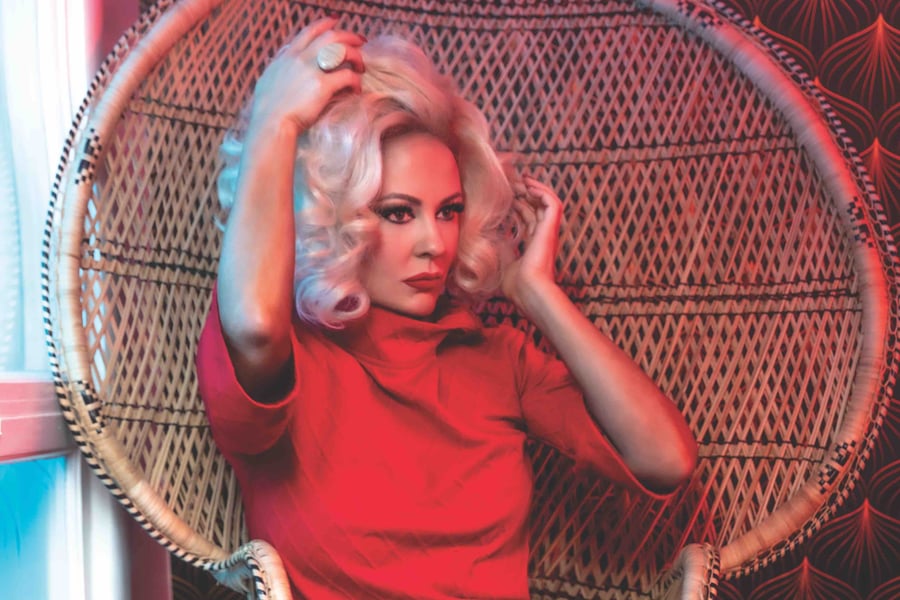When she finished recording her new album, Sara Evans decided to re-watch Mad Men and found herself thinking about embodying a character like the impeccably dressed, mysterious Betty Draper.
“It came to me: ‘You know what? I should wear wigs for the album artwork because I’m copying other artists,’” says Evans, calling Rolling Stone during quarantine. “It’s a covers record, so when else can I really just go into character?”
On the cover of her new Copy That, Evans appears in a striking blonde wig, jaw set and gaze fixed on someone out of frame. The image — a series of them with Evans incorporating an almost campy, retro aesthetic appear in the album package — looks like something from another era, a mix of toughness and vulnerability with a few secrets sprinkled in for good measure.
“I named that character Patricia, because that’s my mom’s name,” Evans says. “I thought, this would have been my mom if she had gone to Hollywood to become a movie star — because my mom is so beautiful — if she’d dyed her hair blonde and not got married right out of high school and started having kids.”
Since making her Nashville debut in 1997, the Missouri-born Evans has proven to be consistent about at least a couple of things. One, she loves to toss in a surprising cover song, and two, her albums showcase a lot more artistic range than her hits like “Born to Fly” and “Suds in the Bucket” — total bangers that they are — would suggest. On her breakthrough 2000 album Born to Fly, when her sound began to shift from neo-traditional twang to country-pop, she covered very-hip-again Bruce Hornsby’s “Every Little Kiss” and brought in mighty rock session drummer Matt Chamberlain after hearing his work on the Wallflowers’ debut.
“If you don’t go really deep into my music and you only know the singles that I’ve had on radio,” she says, “you don’t really know everything about me as a singer and an artist.”
She may be going into character in a sense, but Evans does her best to give a full picture on Copy That. Over 13 tracks, she visits six decades of music including classic country, Seventies FM rock, new wave, and nearly every point in between. In a way, it’s a return to her origins, when she was singing in her family band and trying to fill four hours of set time with a repertoire that would keep patrons returning to the bar.
Love Music?
Get your daily dose of everything happening in Australian/New Zealand music and globally.
“I grew up onstage in bars, doing the 9 p.m. to 1 a.m. shows, covering songs,” she says. “Not just country songs, but everything that would make a popular, fun set list for people who wanted to get drunk and dance.”
Evans set up a meeting with producer Jarrad Kritzstein (better known as Jarrad K) after becoming obsessed with his work on Ruston Kelly’s album Dying Star. She liked that it didn’t sound anything like a lot of the other country projects of the moment.
“I wanted to get a sense of, was that mostly him or was that mostly Ruston, or a good combination,” she says, “and it was a good combination of Ruston being an incredible singer-songwriter but Jarrad knowing what to do with that.”
They clicked immediately and began a group text that included Evans’ grown children Avery, Olivia, and Audrey (all of whom appear on Copy That), sharing song ideas back and forth. Evans had previously convened her guitar-playing son Avery and singer Olivia for their all-covers Barker Family Band EP in 2018, trying out Beyoncé and Fleetwood Mac tunes. Eventually, they had to start whittling down the list and hit the studio.
“You grab a bunch of clothes, and some of them are not going to fit when you try them on,” Evans explains.
On the album, Evans does a gospel-soul reworking of Patsy Cline’s “She’s Got You” — featuring a greasy guitar solo from Avery — and eases into the quiet heartbreak of the John Mayer album cut “All We Ever Do Is Say Goodbye.” She holds her own with Little Big Town’s Phillip Sweet on Kenny Loggins and Stevie Nicks’ “Whenever I Call You Friend,” and enlists Old Crow Medicine Show for a Nashville Sound-style remake of Hank Williams’ “I’m So Lonesome I Could Cry.” Carole King’s “It’s Too Late” gets a nudge from some beefy drumming and glockenspiel.
Then there are the truly off-the-wall choices, like a faithful read of Dexys Midnight Runners’ oddball hit “Come On Eileen” and a groovy remake of Yvonne Elliman’s disco number “If I Can’t Have You.” Evans even tackles the Knack’s decidedly NSFW new wave classic “My Sharona.” She admits to making a few changes though.
“Reading the lyrics, I was like, ‘Ooh, ‘My Sharona’ is really dirty!’” she says, laughing. “The #MeToo Movement would not approve of that song. I changed a lot of the lyrics and I chewed them up and nobody understood what I just said.”
Evans needn’t have fretted. As she says, the album is a character and a rare chance to break free from the restricting binds of a genre she no longer recognizes (“I just feel like aliens have come in and taken country music and done something with it,” she says). Copy That is Evans — there’s no mistaking that voice — but Evans in disguise. In that striking blonde wig.
“I wanted this blonde character to be a combination,” she says. “Tammy Wynette meets Betty Draper meets that quintessential woman from the Sixties who smokes all day and always had on cute hot pants and her hair done.”



































